- Home
- Nick Carter
Death of the Falcon Page 12
Death of the Falcon Read online
Page 12
There was one more call I had to make before taking off. Hawk listened as I told him what Candy had reported, then said, “The man he picked up at the embassy may be the Sword, N3.” As I concurred, he went on, “And I recognize that address on Military Road. It’s one that the CIA uses on occasion as a ‘safe house’. I thought we were the only ones, other than the CIA, who knew about it, but obviously the enemy has pretty good intelligence sources, too. You realize what the Sword probably intends to do, Nick?”
“That’s where the Silver Falcon will be found dead,” I said. “And there will be plenty of evidence to indicate that she was working for the CIA and was slain when she threatened to expose her former employer’s plotting in Adabi. But doesn’t the CIA keep someone on the premises at all times?”
“I would think so. But the Sword hasn’t hesitated to kill anyone else who stood in the way of his plans. And if, as Miss Knight says, he and that Bedawi fellow went right into the house, they probably had already done their killing.”
“I’m on the way, sir,” I told him. I had been checking my map as we talked and estimated that it would take me about twenty-five minutes to reach the address on Military Road. Hawk said he would send a back-up team after me as quickly as possible. Most of the local agents were in the field attempting to track down the VW camper and its deadly crew, but he said that he would divert a team to my assistance immediately. I knew that it was a task for a Killmaster, however, and asked him to instruct his men to hold back, unless it was absolutely certain that I needed help.
He would relay the proper orders, he said, then wished me luck—something he didn’t usually bother to do—and broke the connection.
Chapter 10
As I stepped out of the door of my room, something hard rammed into my back and a cool, even voice said softly, “Let’s take the service elevator down, Mr. Carter . . . No, don’t turn around.” The order was enforced with another jab in my spine. “This is a .357 Magnum, and if I have to pull the trigger where I have it pointed now, most of your backbone will be coming out through your stomach . . . That’s better, just keep walking back along the hall to the elevator and be certain to keep your hands straight down at your sides.”
I didn’t have a chance to warn the operator when he opened the service elevator door. The blackjack clubbed him to the floor of the car immediately. Just before that, I had felt the pressure in my back ease for an instant, and as I looked down at the operator’s shattered forehead, I knew that my captor had switched the Magnum to his left hand, leaving the right free to bludgeon the man.
Following orders, I dragged the elevator man into a nearby linen closet and slammed the door on him, hoping he would be found in time for medical aid to be of help. The action had given me an opportunity to see the man who kept the big handgun leveled at me as I worked. He was another Arab, shorter and huskier than the one who had died on the balcony with my knife in his throat. He switched gun hands again long enough to take a swipe at the housekeeper’s linen closet key which, fortunately for his purposes—or, perhaps, by arrangement—had been left in the lock on the linen closet. He was an expert with the little leather sap. The blow snapped the key in the lock, making certain that discovery of its battered contents would be delayed even longer.
“Now we’ll go down to the cellar, Mr. Carter,” my heavyset companion said. “Just walk straight into the elevator, facing the back wall . . . That’s far enough . . . Now, just lean forward from the waist and put your hands flat out against the wall. You’ve seen the police searching prisoners, Mr. Carter, so you know what to do . . . That’s right, and don’t move.”
We made the trip to the lower level of the Watergate in silence. The buzzer sounded to indicate that buttons had been pushed to signal for pickups on several floors, but the car was set on manual control and the Arab didn’t stop. When the doors finally opened, I already had been given instructions for my exit: Turn around, hands back at my sides, and walk straight out of the car and turn left. If anyone is waiting, just walk right by as if nothing is wrong. If I did anything to arouse suspicion, I and several innocent persons would die.
No one was waiting in the cellar, but as we walked through the connecting corridors that led to the Watergate parking garage, two men wearing hotel service department uniforms looked at us curiously. To save their lives, I pretended to be talking amiably with the man who was sticking close to my side, his gun now jammed into my ribs from his jacket pocket. They apparently decided we were hotel executives or guests who had gotten lost looking for the garage and passed us without saying anything.
“Nicely done, Mr. Carter,” my polite captor said when we were out of earshot of the pair. He dropped back behind me again, giving directions that eventually led us to a remote section of the garage. Only a few cars were parked there—plus a Volkswagen camper. No wonder it hadn’t been spotted by the patrols. The Arab with me must have dropped off his companions somewhere, then driven directly to the Watergate garage and waited outside my door almost from the time the hunt for them began.
Automatically, I started to head toward the camper, and the Arab interpreted the action correctly. “So you know about that, Mr. Carter. We felt certain you would. That’s why I was sent to pick you up. However, we will be using the car that is parked next to the Volkswagen. It’s been here since last night. One of our men never returned to it from a visit to the roof. I’m sure you know why.”
I didn’t answer, but my talkative friend obviously hadn’t expected a reply, because he continued: “Walk right up to the rear of the Vega, Mr. Carter. You will find the trunk is open. Just raise it and climb inside, slowly. There is no one around, but all the same, I would not like to fire this gun inside the garage. The sound would be quite loud and if someone came to investigate, he would have to be killed, too.”
I had just about reached the Vega’s trunk when the gunman apparently realized he had made a serious error and corrected it right away. “Stop there, Mr. Carter. Now, lean forward onto the trunk lid . . . I’ll just take this gun. All right, you may stand up again and open the trunk . . . If you’ll just get in and make yourself comfortable, we’ll be underway.”
Folding myself into the cramped quarters, I made certain that my head was as far back under the overhang as possible, while keeping my legs close to the opening. As I scrunched around, the Arab kept the Magnum pointed at my head; then, when I seemed to be settled, he stepped back and reached up for the trunk lid. As it started to descend I kept my eyes on his body, making certain he hadn’t moved away any further. At the moment I knew his view of me would be completely cut off by the almost closed trunk lid, I lashed out with both feet, putting all the force of my coiled legs behind the kick.
The trunk lid jumped upward, slammed into something, and kept on going. By the time I could see out, I found myself staring at a grotesquely twisted face on a head that was tilted backward at what looked like an impossible angle. Unseeing eyes that already were starting to glaze peeked out at me from over the bottom edges of their sockets. A hand holding the big Magnum involuntarily jerked out toward the car trunk, but the nervous system never had passed on the signal to those frozen fingers to pull the trigger.
As I threw one leg over the edge of the trunk and started to get out, the dying Arab suddenly fell backward, stiff as a board. The back of his oddly tilted head struck the concrete garage floor first and jerked forward again with a loud crack. It .was only as I was bending over to retrieve my Luger from the belt of the man who had held me prisoner, that I realized what had happened when I’d slammed the trunk lid upward. Its edge, like a blunted guillotine blade, had caught him under the chin, snapping his head back with such force it broke his neck.
Searching his pockets, I found two sets of car keys. One ring had a tag on it bearing the same plate number is the VW camper and the name of a car rental agency. I tried one of the keys on the other ring in the trunk of the Vega and it worked. That was pretty strong evidence that this man had been with the on
e I’d knifed on Sherima’s balcony the previous night. I wondered who else might have been along on what must have been an assignment to kidnap the former Queen. Could the Sword have been on the hotel roof, too? Was the one I had killed accidentally when Candy panicked and bumped my arm trying to tell me that without speaking as he had kept rolling his eyes upward?
There was no time to check out the VW, and I didn’t want anyone to suddenly find me with a dead man in the garage. I dumped him into the Vega trunk, slammed down the lid that had taken his life, and got in the driver’s seat. What the hell, it would save AXE cab fare to Military Road and be one less corpse for Hawk to have to arrange to cart out of the Watergate.
Twenty minutes after I paid the parking fee for the Vega—the ticket had been stamped in almost sixteen hours earlier at one A.M.—I was passing the address I wanted on Military Road. Fortunately, most District Police cars were concentrating on the hunt for a VW camper that afternoon and not bothering with traffic light offenders or speeders, so I had made it fast and without getting stopped. I pulled around the next corner and parked. Walking back to the intersection, I noticed a large, low cluster of buildings on a rise across the street and decided that was likely the ground of St. John’s College, where Candy should be waiting for me. I turned the corner and walked rapidly back on Military Road, not wanting to risk having to explain to some helpful passer-by that I knew there wasn’t supposed to be any parking on that side of the street and that there wasn’t any space on the other side, and that I was in a hurry.
As I drove by, I had taken a quick look at the house where Candy had said Abdul and the man Hawk and I suspected was the Sword had gone inside. It seemed to fit into the neighborhood of red brick, split-level ranch houses. Probably about twenty to twenty-five years old and tree-shaded in summer, it was boxed in by “hedges that had been allowed to grow just high enough to block the view of casual passers-by, without appearing as an obvious guarantee of privacy. The break in the front hedge came at the driveway, which led to a two-car garage at the rear of the property. A flagstone walk led up to the front door. From all outward appearances, it looked like the home of a moderately well-to-do family.
If the CIA operated its “safe houses” as AXE did those it maintained, that image of respectability would have been carefully cultivated by the regular occupants of the house. Hawk usually assigned two agents to each of the havens that we used for clandestine meetings, or to hide enemy agents who’ve “turned” until complete new identities can be established for them, or as recuperation sites for wounded personnel. The resident agents, usually a man and woman who posed as a married couple, are instructed to be friendly with their neighbors, but not so sociable that the people next door come calling unexpectedly. Hawk likes to set up our safe houses in residential locales, rather than in remote areas more open to surprise attack. And it seemed that the CIA had adapted a similar setup, at least in so far as their selection of neighborhoods.
I walked past the house and went up to the door of the home next to it. It opened a moment after I’d rung the bell, but only as far as a chain permitted. A gray-haired woman poked her nose around the opening at the same time the muzzle of a German shepherd jutted out at me. The woman asked pleasantly, with just a trace of suspicion, “Yes?” The shepherd didn’t say anything, but expressed his suspicions more clearly with a deep growl. She quieted him with a, “Hush, Arthur!”
“Excuse me,” I said, “but I’m looking for the DeRoses. I don’t have the exact number, but they’re supposed to live on Military Road, near Utah, and I thought perhaps you might know them.”
“No, I don’t recognize the name. But there are a lot of new people in the neighborhood in the past couple of years.”
“They’re a young couple,” I explained. “She’s a blonde, about thirty, and Augie is about the same age. He’s a big guy; you’d be sure to notice him, because he’s about six-feet-four and weighs around two hundred and forty pounds. Oh yes, they drive a VW camper.”
She had been shaking her head until I mentioned the camper, then a hint of recognition crossed her face. “Well,” she said hesitantly, “there is a nice young couple living next door. They’ve been there about a year, but I haven’t gotten to know them except to say hello. I’m sure they’re not your friends, though. She’s not a blonde, and he’s not that big. Maybe that tail, but sort of on the thin side. The only thing is . . .”
“Yes?” I prodded.
“Well, I did notice when I drove my husband to the bus this morning to go to work that there was a Volkswagen camper in the driveway over there.”
“What time was that?”
“About a quarter to eight or so, I guess, since that’s when we usually leave.”
“I didn’t notice one over there now,” I said. “Did you happen to see it leave?”
“As a matter of fact, I did. I was just coming out the door later in the morning—it must have been noon or twelve-thirty maybe—when I saw it back off and drive away. I was going down to visit a friend on Legation Street, and—”
“Did you see who was in it?” I interrupted. “Maybe it was my friends.”
“No, I didn’t. It was gone before I got down to the sidewalk, and they seemed to be in a hurry. I’m sorry.”
I was pretty certain where the Volkswagen and its crew of killers had been headed; they had a rendezvous on Canal Road that had been hastily scheduled by a phone call. I thanked the woman for her help and said maybe I would try next door, just in case the people in the camper had been my friends, calling on another neighbor. The shepherd growled again as I turned to walk away, and it almost got its snout pinched as she closed the door.
Walking casually up the drive of the CIA hideaway, I kept going around the side of the house to the garage. Its swing-up door proved to be unlatched and I slid it upward on well-oiled hinges. Sherima’s limousine was still parked there, beside a Mustang that I assumed belonged to the regular occupants of the house. Closing the door quietly, I crossed to the little patio of the ranch house. A barbeque cart, rusted from standing out in the winter snows, stood there.
Not so good, boys, I thought to myself. Real homeowners would have stored the barbeque in the garage for the winter.
The screen door was locked, but a little prying with the point of my stiletto forced it open. The back door was locked, too. My plastic American Express card slid back the bolt, and while I was holding it in place, I tried the knob with my other hand. It turned and the door opened. I returned the credit card to my wallet before pushing the door back further, and was relieved to discover that there was no chain latch on it.
Stepping inside quickly, I found myself in the kitchen. The house was silent as I looked around. Dishes, probably from breakfast, had been washed and stacked in a drainer beside the sink. I tiptoed on into the dining room, then the living room. There was no sign of a struggle anywhere downstairs. Then, just as I was about to start up the half flight of stairs that obviously led to the bedrooms, a small hole in the plaster on the wall beside the stairs caught my eye. Using the stiletto point again, I dug a slug out of the wall. It looked like a .38 that had flattened itself in the plaster. Bending down, I examined the cheap Oriental throw rug that covered the floor in the front entryway.
Almost lost in the pattern was a crimson stain. Someone opened the front door and got shot, I decided. Probably by a .38 with a silencer. There was a coat closet in the little foyer. The door was locked, I discovered, and that was unusual enough to make me want to see what was inside. Trying a few of my master keys, I found one that turned the simple lock.
Slumped on the closet floor under the coats that hung there was the body of a man. The corpse wore a hat and coat and I could tell he had been tall from the way his knees had been doubled up to wedge him into the confined space. Pushing back the hat, which was slouched forward over his face, I saw where a bullet had struck him in the left eye. So much for half of the “nice young couple next door.” He’d apparently been getting ready to
leave the house when someone came to the front door and he’d made the fatal mistake of not using its peephole to see who was outside before opening it. Whoever was standing there had his silenced gun ready, and had fired as soon as the door opened, then caught his victim and lowered him gently to the rug on the floor without the dead man’s “wife” even knowing what had happened.
She had to be somewhere in the house, too, I decided. The Sword’s men wouldn’t have risked carrying out a corpse. Luger drawn, I climbed the stairs to the upper level. In the stillness that filled the house, the slight creak of the carpeted steps sounded loud. A bedroom door stood open to my right at the top of the stairs. I went in and found it empty. Quickly, I crossed to the closet. It held a man’s clothes and nothing else. A quick flip of the spread showed me there was nothing under the bed, so I went back out into the hall and slowly opened the next door on the same side. It was a bathroom—empty. The medicine cabinet over the sink held men’s toiletries and a razor. The dead man downstairs must have had stomach trouble; bottles of antacids lined one of the shelves. Well, it wouldn’t bother him anymore.
Crossing the hall, I walked through another open door into what I guessed from its size to be the master bedroom of the house. The woman I was hunting had been neat; the clothes were tidily arranged on hangers and her shoes were in boxes stacked on the floor of the large double closet. Apparently, she and her partner had maintained a strictly business arrangement despite living together for about a year. Only one of the two bed pillows was rumpled. It suddenly struck me that the spread on the bed was tucked in on only one side. She must have been making it up when the gunman got to the second floor.

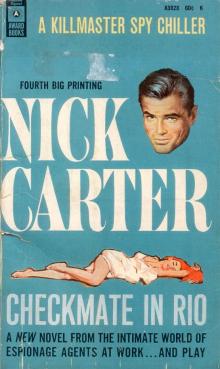 Checkmate in Rio
Checkmate in Rio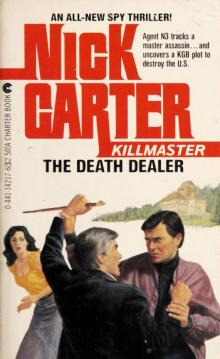 The Death Dealer
The Death Dealer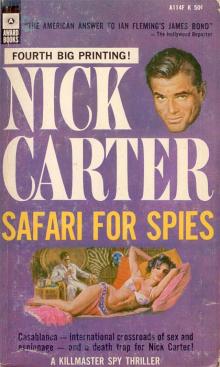 Safari for Spies
Safari for Spies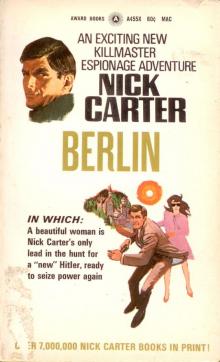 Berlin
Berlin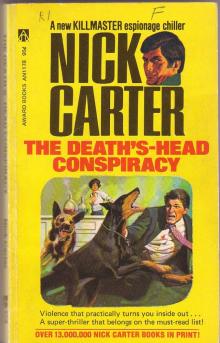 The Death’s Head Conspiracy
The Death’s Head Conspiracy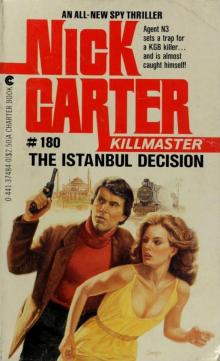 The Istanbul Decision
The Istanbul Decision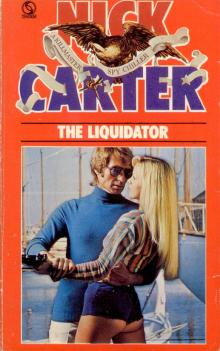 The Liquidator
The Liquidator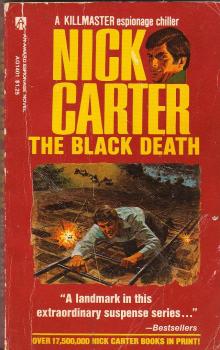 The Black Death
The Black Death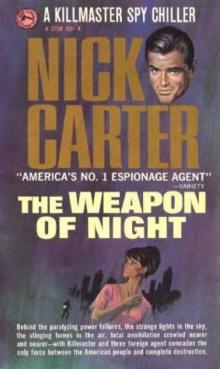 The Weapon of Night
The Weapon of Night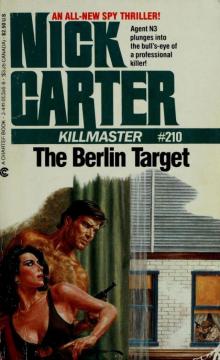 The Berlin Target
The Berlin Target Temple of Fear
Temple of Fear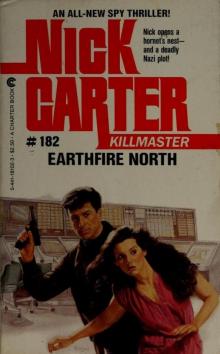 Earthfire North
Earthfire North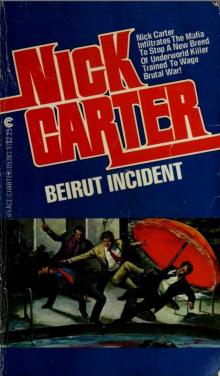 Beirut Incident
Beirut Incident White Death
White Death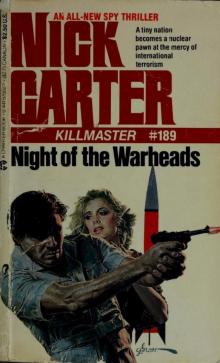 Night of the Warheads
Night of the Warheads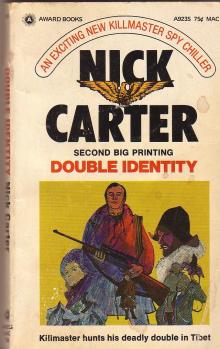 Double Identity
Double Identity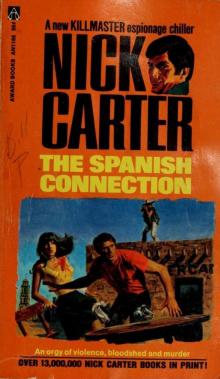 The Spanish Connection
The Spanish Connection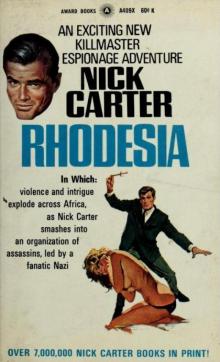 Rhodesia
Rhodesia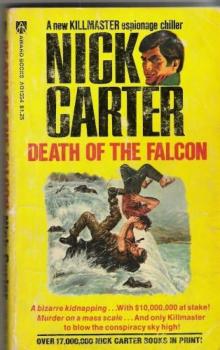 Death of the Falcon
Death of the Falcon The Executioners
The Executioners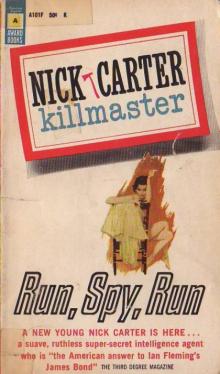 Run, Spy, Run
Run, Spy, Run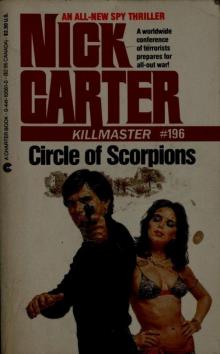 Circle of Scorpions
Circle of Scorpions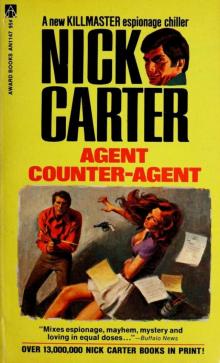 Agent Counter-Agent
Agent Counter-Agent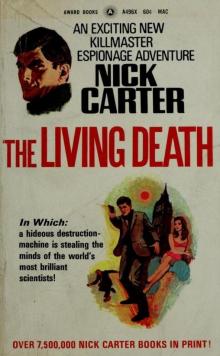 The Living Death
The Living Death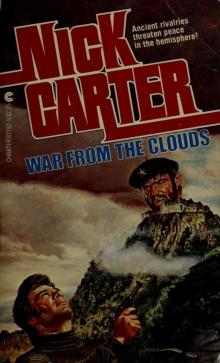 War From The Clouds
War From The Clouds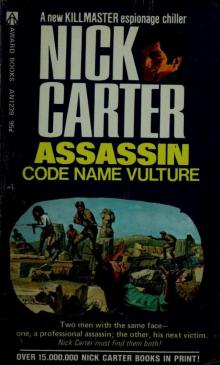 Assassin: Code Name Vulture
Assassin: Code Name Vulture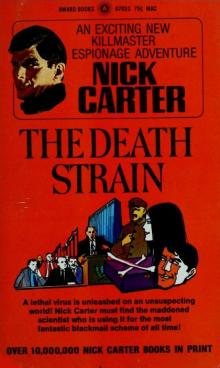 The Death Strain
The Death Strain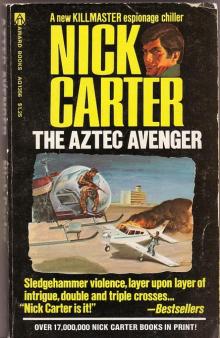 The Aztec Avenger
The Aztec Avenger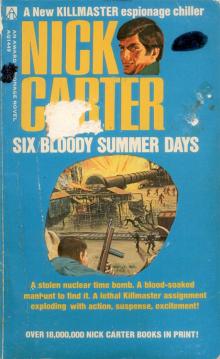 Six Bloody Summer Days
Six Bloody Summer Days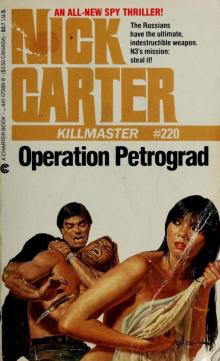 Operation Petrograd
Operation Petrograd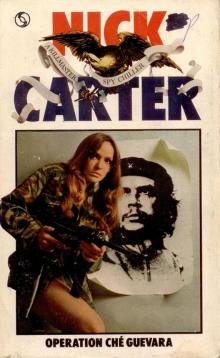 Operation Che Guevara
Operation Che Guevara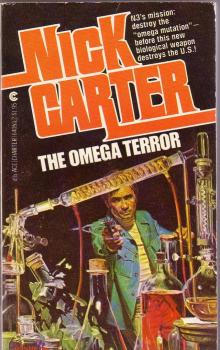 The Omega Terror
The Omega Terror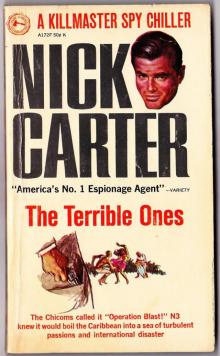 The Terrible Ones
The Terrible Ones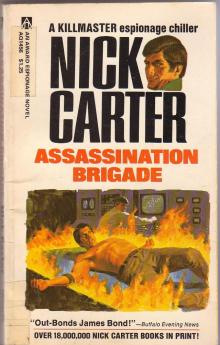 Assassination Brigade
Assassination Brigade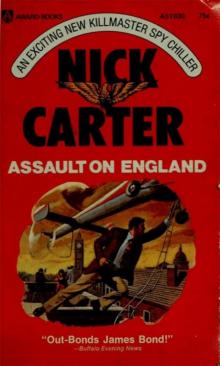 Assault on England
Assault on England The Judas Spy
The Judas Spy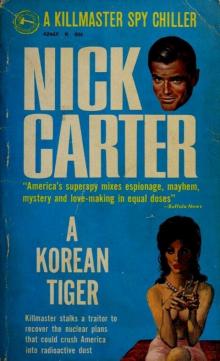 A Korean Tiger
A Korean Tiger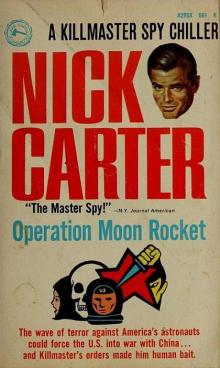 Operation Moon Rocket
Operation Moon Rocket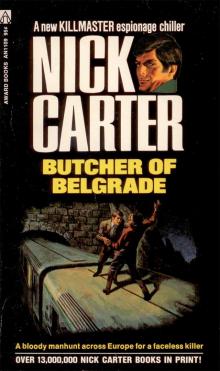 Butcher of Belgrade
Butcher of Belgrade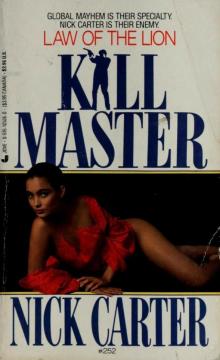 Law of the Lion
Law of the Lion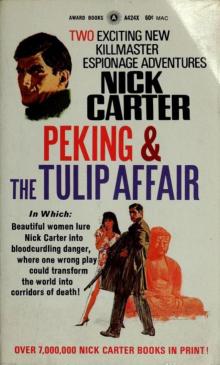 Peking & The Tulip Affair
Peking & The Tulip Affair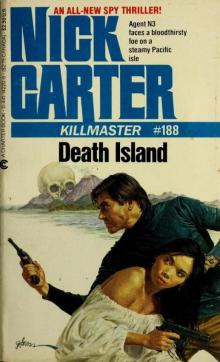 Death Island
Death Island The Jerusalem File
The Jerusalem File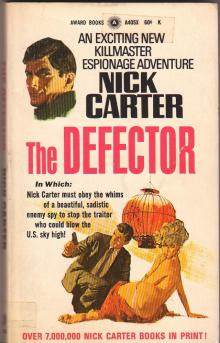 The Defector
The Defector The Fanatics of Al Asad
The Fanatics of Al Asad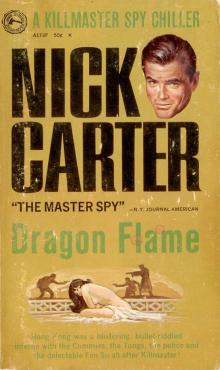 Dragon Flame
Dragon Flame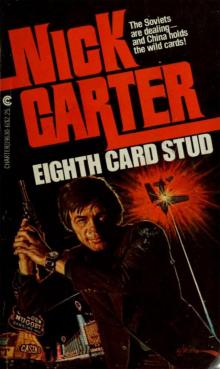 Eighth Card Stud
Eighth Card Stud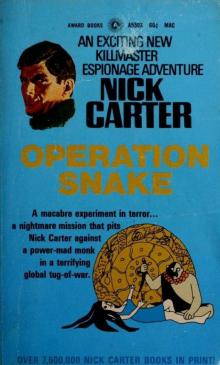 Operation Snake
Operation Snake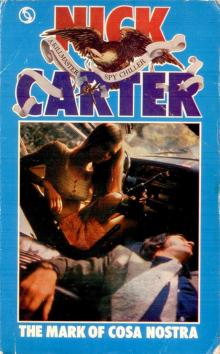 The Mark of Cosa Nostra
The Mark of Cosa Nostra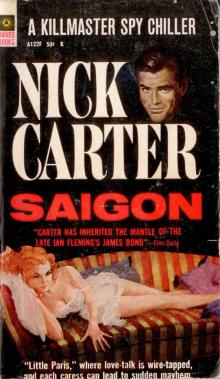 Saigon
Saigon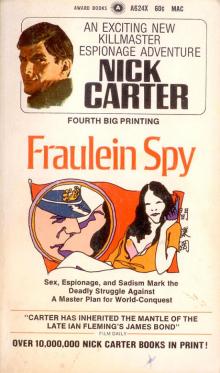 Fraulein Spy
Fraulein Spy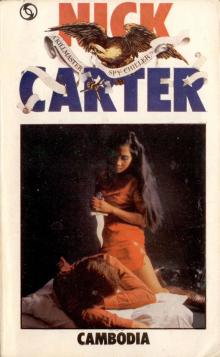 Cambodia
Cambodia Cairo
Cairo